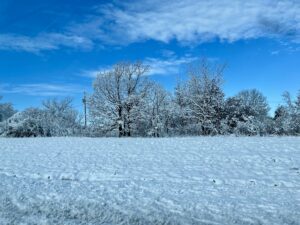
Peg and I like snow. We almost bought a vacation home in the picturesque hamlet of Craftsbury Common, Vermont where her folks are buried. We also looked at locations at Lake Tahoe. Both areas are inundated by winter snows. Vermont’s property taxes were steeper than the snow and only the truly wealthy or truly reckless can buy property in Tahoe. Therefore, we chose Osage County, Oklahoma. Oklahoma does not provide as much snow but it has some and one can enjoy a balanced budget. However, we still are captivated by stories of those hardy humans who find ways to at least survive huge snowfalls such as occur in Nevada-California’s Sierra Nevada mountains and in the mountains of South America’s Andes.
As Peg was sending me out to get more firewood during our recent blizzard, I reflected on our visits to the site of the Donner Party’s ordeal in Truckee, California on the Nevada Border. Most of you know of the Donner Party and of its most salient sociological history. In 1846 eighty-seven pioneers from Illinois followed their western dream but only about fifty of them made it to California. Many of the hardy trekkers died in the deep snows from cold, hunger and illness. And they had to rely on their deceased companions to do so. According to survivor accounts archived at the Donner Party Museum, all parts of their departed fellow humans but their brains provided sustenance. Apparently even starvation was not enough incentive to force down brains.
While Peg and I have been to Donner Pass several times we have not visited the site of another tragic but inspiring experience of humans surviving the deepest of snow thanks to their deceased friends and family. That occurred in 1972 when a plane carrying a Uruguayan rugby team and others crashed about 11,500 feet above sea level in the Andes Mountains. Peg and I found this fascinating true story as related in the film Society of the Snow as we sat in front of a roaring fireplace and sipped wine, red, of course.
The movie that we found channel surfing in the vain hope of finding a football game, as they had all gone Peacock, told the survival story of how eighteen out of forty-five persons on a chartered Uruguayan Air Force flight crashed into a deep mountain snow field. Those who survived for the seventy-two winter days did so, in part, by harvesting the flesh of those who died in the crash or over the days thereafter.
What the amazing depiction made clear was that had the survivors been able to ask those who had not survived, the deceased would not have faulted their living companions. But they would have given of themselves to help those who were barely hanging on through cold and hunger. Of course, none of us wishes to be in the position of either the deceased or the survivors. But it is inspiring to think we too might have the courage and generosity to serve in either role.